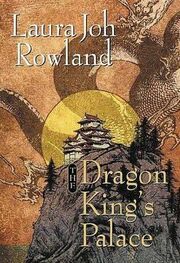Reiko shook her head as if dazed. She cowered under the men’s scrutiny, while outside the thunder boomed and rain fell in a torrent.
Akera staggered over to her. “She murdered Lord Mori!” he cried, his face livid with rage, his finger jabbing at Reiko in accusation. “She cut off his manhood and killed him!”
The rain poured down on Edo. Townsfolk waded through flooded streets. Merchants peered out from behind storm shutters pulled across their shops. Curtains of water veiled the hill upon which Edo Castle stood. Within the castle, guards huddled in turrets and enclosed corridors atop the high stone walls. Soldiers in dripping armor patrolled the soaked passages. But inside his office in a compound near the palace, Chamberlain Sano sat dry and comfortable with General Isogai, who was commander of the Tokugawa army, and two members of the Council of Elders that was Japan ’s chief governing body.
“We’ve requested this meeting to discuss some disturbing recent developments,” said Elder Ohgami Kaoru. He had white hair and pensive, youthful features. He was in charge of the Tokugawa government’s relations with the daimyo class.
“The first is an incident in Bizen Province four days ago,” continued Elder Uemori Yoichi, the shogun’s chief military adviser. He inhaled on his tobacco pipe and let out a deep, phlegmy cough that shook his loose jowls.
“I’m aware of the incident,” Sano said. “The outlaw rebels have struck again.”
During the three years since the war, the former chamberlain Yanagisawa’s underground partisans had still been fighting Lord Matsudaira’s regime within the Tokugawa regime. Many had been captured and executed, but the survivors had recruited new troops from among peasants, gangsters, and disgruntled Tokugawa vassals. They concentrated their attacks on the provinces, where the Tokugawa forces were less numerous.
“This time they ambushed Lord Ikeda’s army,” Sano elaborated. They were after the allies that had supported Lord Matsudaira’s ousting of Yanagisawa, and they’d devised warfare tactics that utilized their relatively small forces to maximum effect. These included sniping, ambush, and arson, plus sabotage of buildings, bridges, roads, and agriculture. “They killed twenty men, then escaped into the woods.”
Everyone looked none too pleased that Sano was so well informed. He knew they’d have liked to control his access to news, the better to control him. But he had a private intelligence service, his defense against ignorance, a fatal weakness for the shogun’s second-in-command.
“My troops are doing the best they can to stop the outlaws.” General Isogai had a loud, forthright manner and a bulbous physique. “But they’re spread too thin. And Edo is vulnerable because so much of the army is deployed to the provinces. Let’s pray that the outlaws aren’t planning a major attack here.”
“We won’t know until it’s too late,” Ohgami said.
Uemori nodded. “The metsuke is spread as thin as the army.” The official intelligence service had been working overtime because Lord Matsudaira had its agents keeping tabs on his growing opposition within the government.
Thunder cracked; rain cascaded from the eaves. “This weather doesn’t help,” General Isogai muttered.
It had been an exceptionally wet rainy season, with serious, countrywide flooding. Every news dispatch contained stories of washed-out villages, of families drowned or homeless.
“Nor does it help that so many townspeople have rushed to take advantage of a bad situation,” Ohgami said.
“Crime is rampant,” Uemori noted. “Thieves are looting flooded homes and businesses. Edo Jail is overflowing.”
“Many members of the bakufu have also taken advantage.” Ohgami grimaced in disgust at his colleagues in the military government that ruled Japan. “Officials have embezzled from the treasury and stolen from the Tokugawa rice stores. Tax collectors are taking bribes from daimyo and merchants to reduce taxes and falsify the account books. We have such a serious shortfall of funds that we may not be able to pay stipends to the thousands of samurai in the regime.”
“Well, we know one cause of those problems,” Ohgami said. “It is all the officials who are new to their posts.”
During the purge immediately after the war, many experienced officials had been replaced by men whose main qualification was loyalty to Lord Matsudaira. The novices didn’t know how to discipline their idle, corrupt underlings.
Sano grew restless because the elders were prone to complain rather than take action. “Well, unless anyone has any solutions, may we adjourn this meeting?” He was nominally their superior, but their seniority and age gave them special standing, and he pretended to defer to them.
“Not so fast,” General Isogai said. “We’ve one more topic to discuss.
“It’s the methods you’ve used to solve the problems,” Uemori said.
Ohgami hastened to say, “Not that we mean to criticize you for taking action when others couldn’t.”
Sano heard the shared, unspoken thought that the shogun was a fool, useless at administration, and Lord Matsudaira couldn’t handle the problems either because he was too busy maintaining his political power to bother with the specifics of governing.
“Please go on.” Sano knew from experience that the men were about to criticize him, regardless of their disclaimers.
“You certainly have made progress toward straightening out the regime’s finances,” Uemori said in grudging admission.
Sano had sent his private spies to watch the treasury and the rice warehouses. He’d caught thieves, recovered loot, and restored the flow of money into the Tokugawa coffers.
“And you’ve reestablished a semblance of law and order in the city,” Ohgami said. During the past three years, Sano had built up a large personal army, which he’d assigned to patrol the streets and help out the police.
“We thank you for taking on tasks that another man in your position might perceive as below his station,” Uemori said.
Sano nodded, acknowledging that he’d been given the dirty work of the regime. He’d done what he had to do, and he couldn’t help being proud of what he’d achieved. “But…?” he prompted.
Ohgami spoke delicately: “Your methods have been rather, shall we say, unconventional.”
That was not a positive attribute in a society that valued conformity and custom.
“I’ll say.” General Isogai chuckled. “It was brilliant of you to punish the thieving officials and the idle bums by sending them to help out in flood disaster zones. And I like how you made the daimyo tax cheats run jails on their estates. That’s turning rotten plums into good wine.”
Ohgami coughed. “The shogun and Lord Matsudaira appreciate your competence. And you’re much admired by many people.” Sano had built up a large following of military allies among daimyo and Tokugawa vassals who respected him because he was honorable as well as powerful. They included the two elders-who were top advisers to the shogun-and General Isogai, who could lend the might of the Tokugawa army to anyone he wished.
“But you’re feared by others because of your control over society,” said Ohgami. “You’ve made a lot of powerful enemies.”
Which included people Sano had punished. General Isogai said, “How many assassination attempts on you have there been this year? Three?”
“Four.” Sano had been ambushed, attacked on the street, shot at, and almost poisoned. He now employed a food-taster and never went anywhere without bodyguards.
“Police Commissioner Hoshina hasn’t missed the opportunity to lure your enemies into his camp,” said Uemori.
Читать дальше






